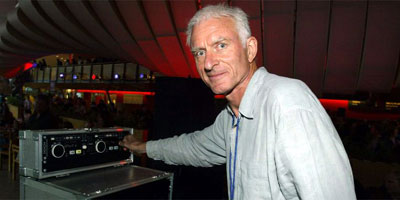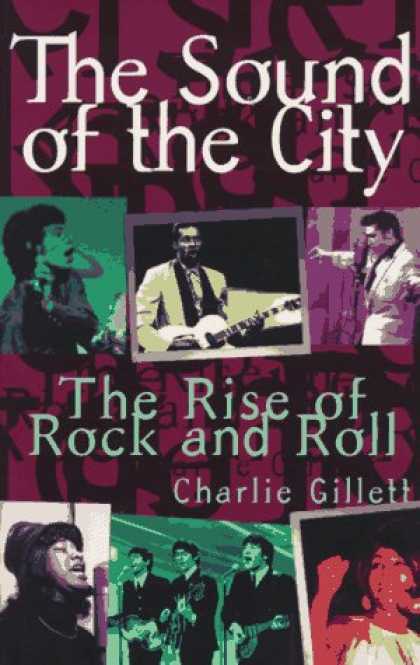So rock’s other big loss this week, the death of writer/DJ/indie label founder Charlie Gillett, has had me thinking about the title, if nothing else, of his classic early rock history book, The Sound of the City. The reason I stress the title is because I have a terrible memory and what I want to discuss may actually have little to do with Gillett’s book.
Do you still hear the sound of the city in today’s rock ‘n roll?
For those of you who don’t a thing about Gillett, I never got to hear his UK radio broadcasts, but as a DJ he was a legendary supporter of the Pub Rock scene and helped break artists who grew out of it, such as Elvis Costello, Graham Parker, and Dire Straights. He also founded an indie label, briefly managed Ian Dury, and probably played guitar on a Rolling Stones session following Mick Taylor’s departure from the band and preceding Ron Wood’s official membership. He would also be a pioneer in spreading World Music, about which I’m still playing catch up and won’t pretend to know enough to get wrong.
Although I’m sure to have gotten something scrambled regarding my memory of having read it, I can vouch for The Sound of the City: it’s excellent – or at least I remember it being excellent. I last read it when I was a teenager, and if I have any memory left it told the tale of how rock ‘n roll came together, as a stylistic array of musicians from various rural and small-town regions migrated to America’s cities.
As I said, the title has always made an impression on me. Those who really know me know that I play up my “urban street cred” as much as any educated rock ‘n roller. Yeah, I went to a private school (a Friends school, no less!) and was a snobbish outcast in my lower middle-class, rowhouse neighborhood, but I did grow up surrounded by concrete, bricks, classic American muscle cars, cops and union workers, the kids of cops and union workers, and dudes with thick Philly accents who played street hockey when they weren’t having “keggers in the woods.” My parents and grandparents and aunts and uncles have real Philly street cred, but believe me, I’ve got enough.
Whether the connection I recall making when reading The Sound of the City was intended or not, I seem to think that part of the book’s premise was that rock ‘n roll was a “city” music: it reflected the mixing pot of characters making and selling the music, post-war industrialism, crowded living conditions, concrete and bricks, and all that stuff I’ve always taken undue pride in having experienced. To me, that made sense. I think of early rock ‘n roll rhythms, the subject matter, and the energy that was clear in large swaths of rock ‘n roll, regardless of individual styles, through the punk era. Then that basis in “urban” rhythms seemed to drain out of rock ‘n roll, becoming the sole domain of rap/hip-hop artists. Has “white flight” left us with The Sound of the Suburbs (not the band), with bands based in urban areas as likely to be playing bluegrass music as anything reflecting the sound of the band members’ surroundings?
Over the years, a core part of my geezer’s bitching and moaning about the constantly declining state of rock ‘n roll music is that the form has lost its connection to the sound of the city. Whether this is a bad thing or not is not the issue at hand. What I’d like to know is, Do you still hear the sound of the city in today’s rock ‘n roll? Did you ever?
As always, along with considering the main topic I propose, feel free to correct my memory, criticize my presumptions, and so forth.




Another loos in Rock was the death of Lolly Vegas on March 4, 2010 at age 70. Lolly Vegas was the singer, songwriter and lead guitarist for the band Redbone. They had a huge hit in 1974 that reached #5 on Billboard called “Come And Get Your Love”
I was contacted by Lolly’s family (who are fans of my music) to do an acoustic cover for them. I made a MOG post of that here and also included a great live performance video of Redbone:
http://mog.com/gilsmusic/blog/1846422
Thanks for finding us and sharing, gilsmusic. That song is ETCHED into my brain from childhood!
My first SPectrum concert invloved Redbone. DRUM SOLO!
Just a note that Lolly Vegas, who was in the Shindig house band before starting Redbone, played a bit part in the pub rock saga by co-writing Ju Ju Man and Niki Hoeky with Jim Ford. R.I.P.
I live in Midtown, a semi-urban part of KC, and it seems to me that the hipster kids who start bands and play in the clubs here and in the rattier parts of downtown live in the city, not the suburbs. But they probably were raised in the suburbs, so maybe the migration is still happening, though it’s from suburban, rather than rural, to urban.
BigSteve, I’m not wondering whether clubs are still located IN the city and doubting that younger musicians still don’t migrate TO the city whether that the “sound of the city,” if you believe there ever was such a thing, has continued to drain from rock. Not completely – and there are still plenty of bands that ape the sounds of “TSOTC” bands, most obviously the Velvet Underground – but I feel rock ‘n roll’s sound has been “suburbanized” over the last 20 years.
Mod, can you try to pinpoint what the suburbs sound like?
Yes, BigSteve: Sufjan Stevens. You highly doubt my premise, don’t you.
Rather than glibly throw out some name like Sufjan Stevens, who may or may not qualify for the Sound of the Suburbs (his music annoyed me so much the couple of times I tried it I had to block it out of my memory), I’ll say that the Sound of the Suburbs is partially a function of our bedroom/laptop culture added onto a long-diminishing sense of “rock ‘n roll schooling.” We emerge with homemade albums so easily, with no one challenging us, no one teaching us or having us “pay our dues.” I think the changes in our process of making music have negated much of what used to come out of people rubbing up against each other within fairly tight constrictions.
The early years of rock ‘n roll were directed toward PRODUCT, and the means of making this PRODUCT were more likely to conform to a model similar to factory or industrial work. There seemed to be a more utilitarian aspect to the making of music: “It’s got a good beat and you can dance to it.”
Of course PRODUCT is still a major objective of today’s music makers, but the end result is a little more ephemeral and tied into notions of BRANDING, MARKETING, and ART.
Where’s tomorrow’s Thrifty Music? Will tomorrow’s Hrrundivbakshi need to scour old hard drives for forgotten mp3s? That British disco “diva” can land a record review completely devoid of the concept of music. Does one even need to listen to her music, let alone buy it, to get value from it? We might as well make “scratch and sniff” music if that’s all there is.
I”m not trying to go all geezer on anyone, but did anyone feel that rock ‘n roll ever had a “city pulse” to it? Does anyone feel that’s any longer the case? Getting beyond the backstory of Pavement or Sufjan Stevens or the music any of us make, does the notion of the Sound of the Suburbs, a music culture that comes from a more-contented, less-connected place, make ANY sense? Really, I’m not looking to form lists of who is and isn’t “suburban” – and the first person who sends me a Wiki link to a “city” artist who was born and lived in some town of 312 people in Montana will be sorry:) Think about it, that’s all. And feel free to tell me I’m an idiot.
If nothing else, check out some of the links I embedded regarding Charlie Gillett. I read Let It Rock, I think it was called, when I was young as well, and I also remember liking that. In the US, at least, he seemed to have fallen off our radar of influential critics, no?
Ohmigawd!
I’m a-gobsmacked! This is the first time that I have ever read someone ranking on Sufjan Stevens. I always enjoy seeing sacred cows struck down, but I cannot fathom how someone could have such a negative reaction to the music of Mr. Stevens. I am truely shocked.
That’s exactly the reaction you were looking for, right???
It’s not that I doubt the premise, Mod. I’m just trying to figure out what it is. I was trying to come at it sociologically, and I see to a certain extent you are too.
I’d say that one aspect of suburbia is its homogeneity. A suburb in the Missouri is shockingly similar to one in Florida or Oregon. I don’t remember a lot of detail about Sound of the City, but I believe one of the concepts was that the sound of Detroit was different from the sound of Memphis which was different from the sound of New Orleans. Ok, if Gillett didn’t say it I will.
Nowadays regional differences are hardly detectable in bands. Calexico is one of the few that comes to mind who sound like where they’re from. I’ve recently discovered Midlake, and I like them quite a bit, but they sure don’t sound like they’re from Denton TX.
I don’t hate Sufjian Stevens, but what I’ve heard just sounds nondescript. Is there anything in the way his music sounds that would lead anyone to infer he was from Michigan?
Yes, BigSteve, I also recall the regional flavors of earlier rock ‘n roll being part of Gillett’s book, or at least I’ll support you in bringing that into the discussion. Again, it’s part of the different “business model” for production.
Good point about Calexico soundling like they’re from where they’re from.
Very funny, jeangray! I really don’t want to drag Sufjan or any other particular artists into the possible discussion that I’m trying to set up. This isn’t “Spot the Suburban Rocker!” but an attempt to see if the “sound of the city” still has a place in today’s rock ‘n roll.